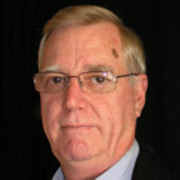
Keith Hawke
Cameraman turned producer Keith Hawke was born in the Otago town of Milton, and grew up in St Andrews, then Christchurch.
As a child, films were far from Hawke's mind. His father was a commercial tomato grower, and Keith spent many hours listening to radio legend Aunt Daisy while tending plants in the glasshouse. But university studies in plant sciences would have to be abandoned after he failed the required physics paper; Hawke was forced to examine other career options.
Having decided his interests included still photography, travel and the female of the species, Hawke decided to become a TV news cameraman. He approached the local television station and was told that news footage was done on contract by private companies. Hawke went to Christchurch's Orly Productions. He was handed a 16mm Bolex camera and told that if he could come up with a news story that was acceptable to CHTV-3, Orly would train him up as a cameraman.
Hawke chased fire trucks until he found a suitable fire, then got out his camera and followed the formula he had noted from watching TV news bulletins. The footage was broadcast; the job was his.
Later Hawke helped set up the camera department at Dunedin´s DNTV-2, where he worked as a cameraman on magazine show Town and Around.
In the late 60s Hawke spent time as a war correspondent and cameraman in Vietnam, before decamping to Australia. Over four years in Melbourne he worked on documentaries, shot commercials for future Evil Angels director Fred Schepisi, and was behind the camera on seminal Australian police show Homicide.
Hawke returned to New Zealand in 1971, and began freelance work as a cameraman for John O'Shea's legendary indie company Pacific Films. While at Pacific he worked extensively with director Tony Williams, including shooting genre-stretching films on the human voice and children's imaginations. Many of them played on television, in documentary slot Survey.
In 1974 Hawke was chosen to be chief cameraman on what would turn out to be one of the landmark television productions of that decade — documentary series Tangata Whenua, the first New Zealand television series to examine Māori life and customs. Hawke worked with director Barry Barclay and writer/interviewer Michael King on locations and marae across the country. The team endeavoured to create more relaxed conditions for those being interviewed, by moving their cameras well back.
Hawke worked with Barclay again on a profile of Indian Prime Minister Indira Gandhi. He was often the man for the more difficult jobs: climbing Himalayan mountains with a Kiwi expedition crew for doco Never Go Near Him, working with fellow cameraman Waka Attewell on A Nice Sort of a Day, joining a rare Western film crew in Burma for the doco To Be Born a Burman, and jetboating for a series with Edmund Hillary.
The 70s also saw Hawke adding directing to his resume. He helmed episodes of the long-running Country Calendar, and in 1979 directed two documentaries about the Niuean experience, both at home and in New Zealand.
As the 80s began, Hawke reinvented himself again, beginning a new career overseas. Having already shot and directed a range of productions in Asia, in 1980 he established Hawke Films (later Hawke Productions) in Hong Kong. Over the next nine years Hawke produced and directed corporate videos and television programmes, before relocating to Singapore.
In Singapore Hawke created weekly television programme Asian Business Report, and helped establish a network of production teams across Asia to work on the show. He called in his old Town and Around colleague Rhys Jones to host it. Hawke also spent time as chairman of the Singapore Film and Video Producers Association.
In 1992 Hawke was one of the producers of Portuguese-funded feature Love and Tiny Toes, shot in Macau. Portuguese actor Joaquim de Almeida starred. The same year, tiring of the bureaucracy in Singapore, Hawke established the company Valiant Point Sdn Bhd in Malaysia. During this period he helped set up cable TV station The Business Channel in Kuala Lumpur, and worked on communication strategies with the Malaysian Government.
During his time in Asia Hawke has worked on many business programmes, and wrote and produced the award-winning Cathay Pacific: From Hong Kong to the World. He also directed a series of films which documented the construction of the Hong Kong Bank building, one of the most expensive buildings in the world at that time.
Hawke continues to work on corporate projects, both here and in Asia. He founded Nelson short film contest the Flying Fives International Film Awards. He has also written two books on his life in film, one of which he sells online: Plough Chains and Bees Arses, an account of his 25 years as a filmmaker abroad.
Filmmaking seems to run in the family. Hawke's son is Auckland cinematographer Nick Hawke, while his daughter, Los Angeles based editor/director Maya Hawke, has worked extensively with legendary director Werner Herzog. Hawke senior would enlist Maya to edit his latest production: Dancing with the Tsar, which documents the creation of a ballet by his wife, ballet veteran Louise Hawke. The film premiered on Sky TV's arts channel in October 2010.
Sources include
Keith Hawke
Hawke Films website
Charles Anderson, 'Capturing creativity on film' (Interview) - The Nelson Mail, 9 October 2010